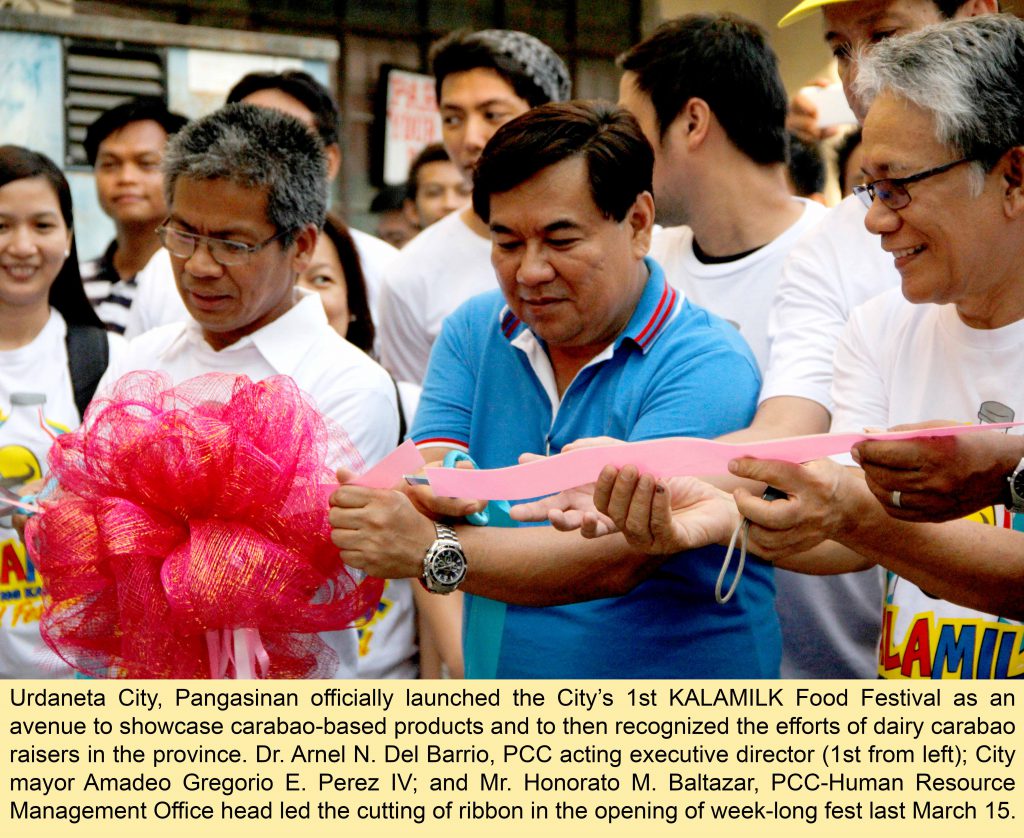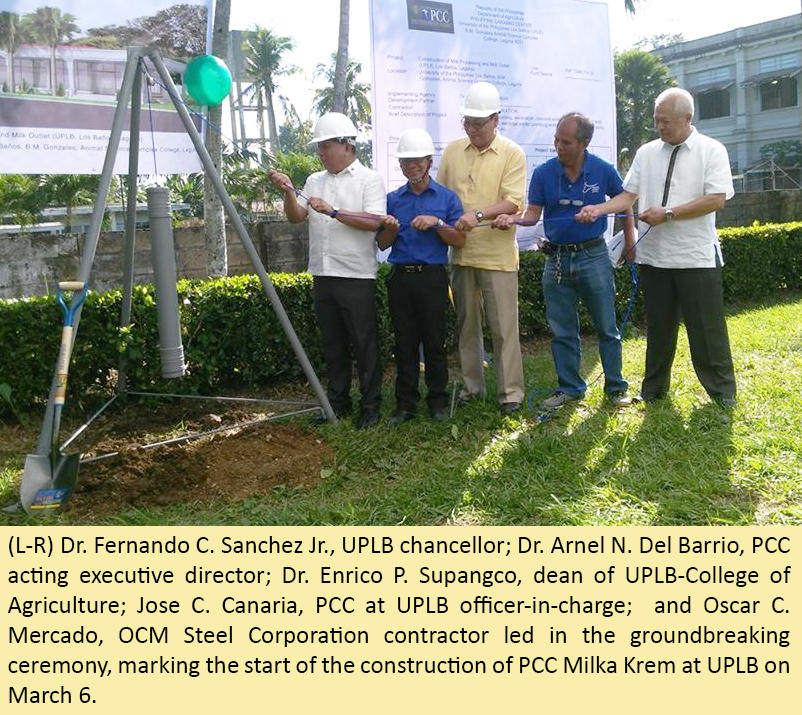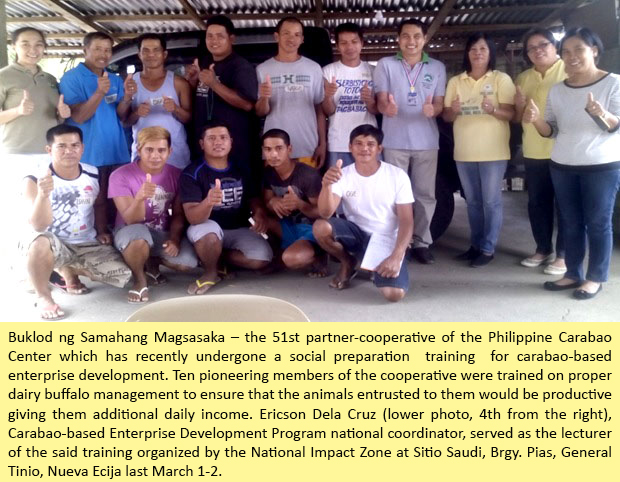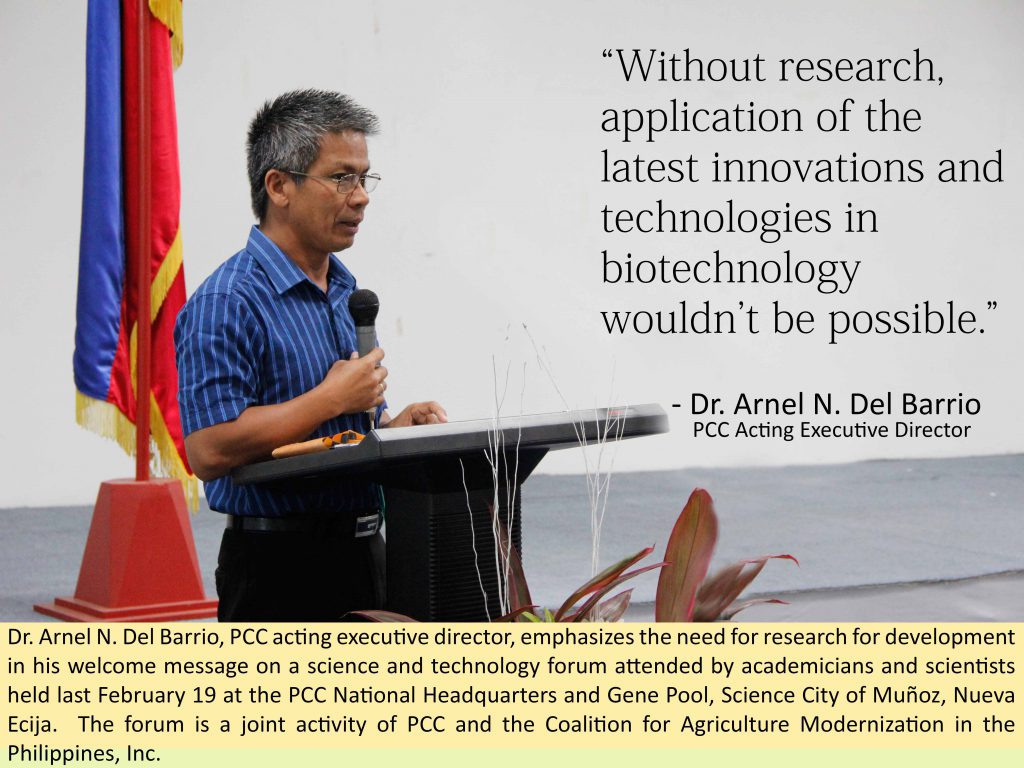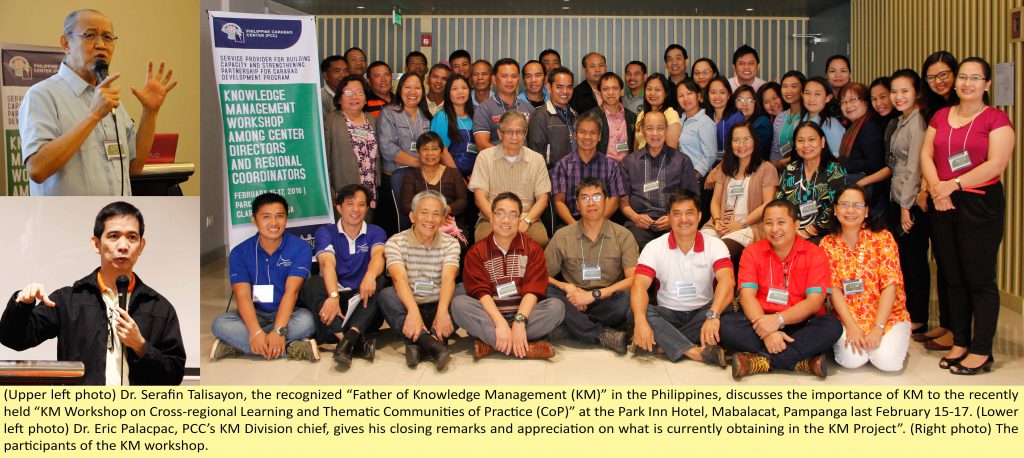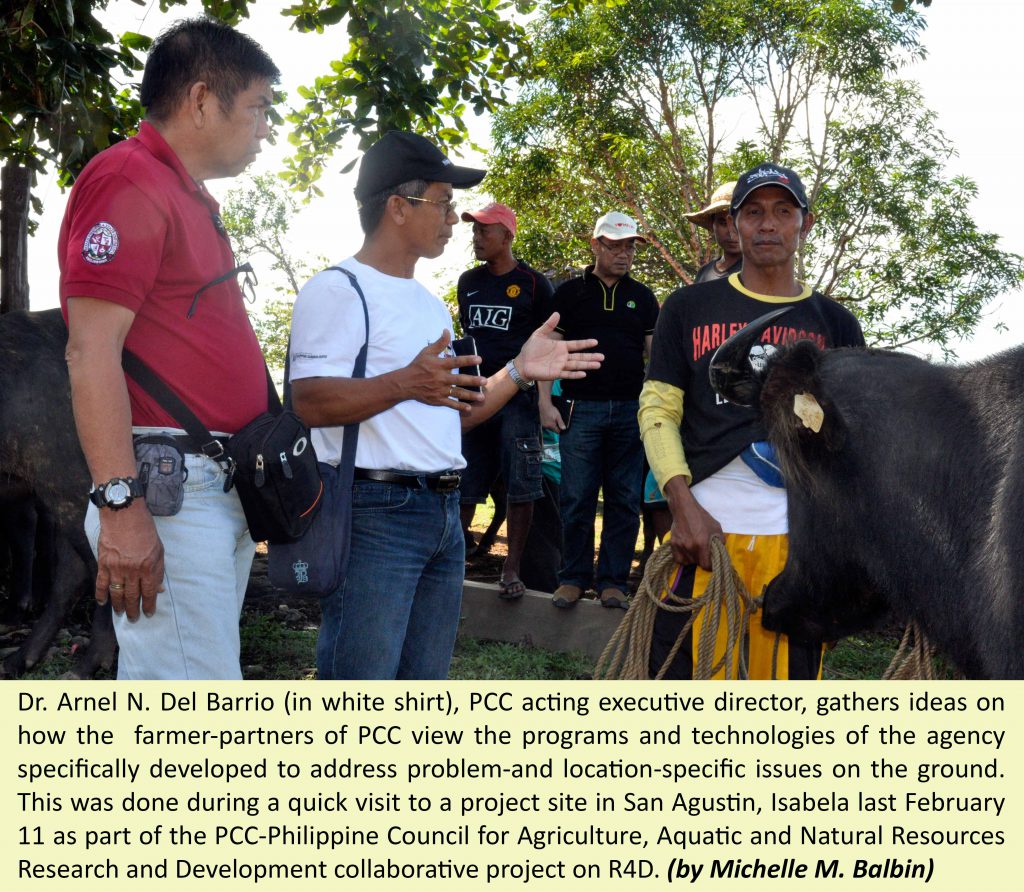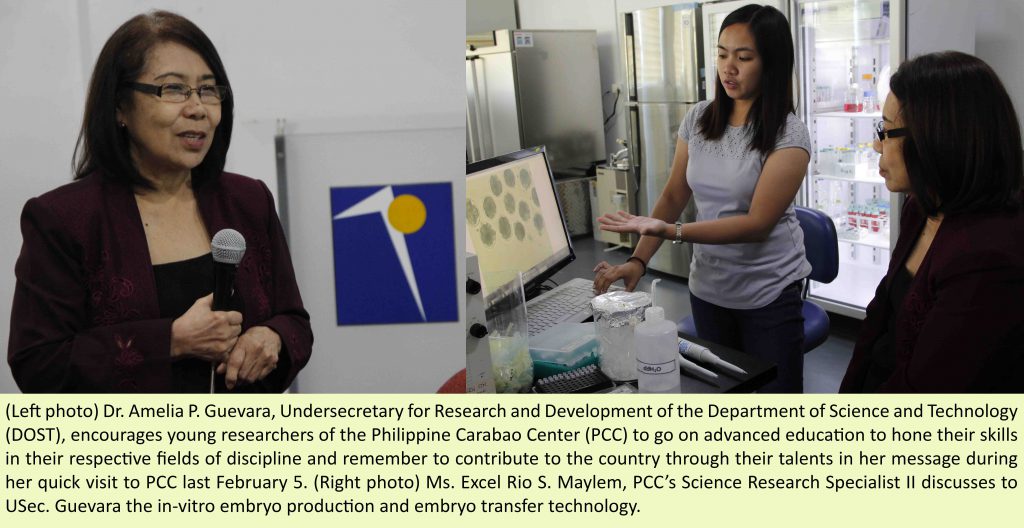Derived buffalo milk products are now made closer to the market for easy reach of customers and to generate favorable environment for enterprise development. It is “Pandora’s Box” of healthy treat and is aptly named “Dairy Box Delicatessen” located along Maharlika Highway, near the main headquarters of Philippine Carabao Center (PCC) in the Science City of Muñoz in Nueva Ecija.
It is managed by a dairy cooperative. It was launched by the PCC, through its Business Development and Commercialization Unit (BDCU), as a venue that focuses on marketing quality products made by local dairy cooperatives.
According to Dr. Arnel N. Del Barrio, PCC acting executive director, the one-stop-shop is about empowering the dairy farmers to continuously grow and flourish through provision of opportunities for value-adding to their products in order to ensure additional income.
The name “dairy box”, coined by Dr. Liza Battad, chief of PCC’s Planning and Information Management Division, connotes a “box of goodness”.
Its soft-opening was held last July 13 while the grand opening was on July 31.
‘Blessing in disguise’
The cooperative managing the newly-opened delicatessen shop is the Catalanacan Multi-Purpose Cooperative (CAMPC), one of the assisted dairy cooperatives of PCC in Nueva Ecija which is the National Impact Zone for dairy buffalo development. Catalanacan is one of the barangays of the Science City of Muñoz.
“Sometimes, opportunity knocks only once in a lifetime. So without any second thoughts, I grabbed the offer to our cooperative to manage it,” Leoncio Callo, CAMPC chairman, said.
The coop has its own processing plant, which was established in October 2014. Chairman Callo, along with the members, has been looking for a product’s outlet when fortuitously he attended a seminar that provided opportunity to meet and converse with Dr. Del Barrio.
“We talked about our cooperative. He then asked me why we are not selling our products in the town to which I responded that I’ve been actually looking for a place where we can do so,” Callo said.
Then, he said, the director asked him “if given an opportunity to lease a product’s outlet, will he consider it favorably?”
“I said I would definitely grab the opportunity since it’s a chance our coop has been waiting for. Then, he told me something about the PCC’s dairy box which is open to any cooperative interested to rent it. He described the dairy box and its advantages to the farmers like me,” Callo added.
The offer was also sent out to other coops that have processing facilities but it was Callo who showed intense interest in it.
One of the agreements spelled out was that the “Dairy Box” will not duplicate products being processed and sold by the adjacent Milka Krem, which is PCC product’s outlet. The agreement with PCC was firmed up and the CAMPC, with a month’s free rental, started operating it.
“My dream, not only for our cooperative but also to all dairy farmers, is to help them attain increased income by processing the milk into different products,” he said.
Other than dairying, CAMPC also has other businesses like palay trading, vermicomposting, lending and others.
Dairy Box operations
The CAMPC has seven original products available at Dairy Box, which include espasol de leche which is sold at Php85 per box, sweet macapuno for Php60; macaroons for Php65, leche flan plan for Php75, bibingkang kanin for Php75, bibingkang gatas for Php75, and bibingkang kanin with pandan flavor for Php75. All of them, with carabao’s milk as main ingredient, carry the brand name “MilKreations”.
The coop processes an average of 30-36 liters of carabao’s milk per day for these various products.
Other buffalo-based products available at the “Dairy Box Delicatessen” which were from consigned local entrepreneurs are polvoron, for Php65 and buko pie, for Php50, both from Eastern Primary Multi-Purpose Copperative, and leche flan with macapuno flavor, for Php75; chicharabao, for Php60; tibok-tibok, for Php85; dulce de leche’ for Php75; sapin-sapin; for Php85, and brownies, for Php135.
The best-sellers among them, as have been recorded by the management, are espasol de leche, bibingkang kanin, bibingkang gatas, and chicharabao (a product sourced from Cagayan’s Lighthouse Cooperative).
“Carabao’s milk is definitely the best base for these products because of its creaminess and nutritional contents,” Callo attested.
According to the financial statement of the coop, the Dairy Box, from its opening date to October, has already chalked up a net income of not less than Php300,000. Its minimum average sale per day is Php9,000 while its peak sale is Php32,000 a day.
Aside from the distinct taste of the products, good customer’s service by the staff appears to be a big advantage in attracting customers to patronize the establishment’s products.
Assistance from PCC
The PCC continuously assists the coop by conducting series of trainings for business enhancement, giving consultations, assisting in marketing aspect, promotional activities, and properly packaging the products.
For the aspiring consigners, the PCC product evaluation team composed of four members headed by Ms. Mina P. Abella, PCC at Central Luzon State University science research specialist II, conducts sensory evaluation testing of the proposed products before marketing.
“The taste of carabao’s milk should be distinct. We are following standards with a passing grade of 7.5 on sensory evaluation,” Jan Czarina Salas, one of the members of the evaluation team and BDCU business development analyst, said.
The evaluation is done every Thursday.
“We have evaluation forms for the consigners. They bring in their products and we will log and evaluate them, tabulate the results and notify them through text if the products did pass or not. If their products passed the evaluation, the developers talk to chairman Callo regarding the pricing, delivery, payments and others,” Salas said.
The developers of the products that didn’t pass the evaluation are advised on how to improve them and submit them again for another round of evaluation.
Other members of the team are Patrizia Saturno, central milk processing plant manager, and Zadieshar Sanchez, BDCU project evaluation officer.
Product development
CAMPC is open for suggestions and critiques from customers about the taste of its products, Callo said. The customer’s feedbacks, he added, will goad them to further improve the product’s per customer’s preference.
“There are other customers who are looking for unusual taste from our products, and we welcome it. We certainly entertain them to meet their expectations,” Callo said.
Future plans
Chairman Callo is hoping that they will open more branches of Dairy Box in the country. He observed that for their three months of operation, the acceptance by the public and the sales are quite good.
“If we can rent another shop for our product’s outlet in Cabanatuan City, that will be great. We believe that in any business enterprise, one doesn’t have to stick to only one because it will be slow a progress,” he stressed.
The Dairy Box, according to Callo, will soon offer different flavors of Bibingkang kanin every month depending on the seasonality of ingredients and the needed innovations for the products.
For all aspiring entrepreneurs, chairman Callo has this to say:
“Don’t be afraid to try and challenge yourselves. Grab every opportunity that comes your way. Have enough courage to venture in your preferred business, expect the ups and downs, but always remember that whenever you feel down you can always bounce back because there are a lot of agencies that are willing to help. Look above, God is always with us to guide us, and believe in yourself. Success is always there for your taking.”

